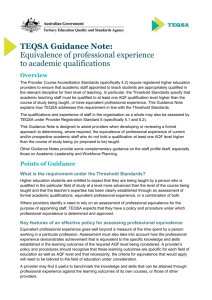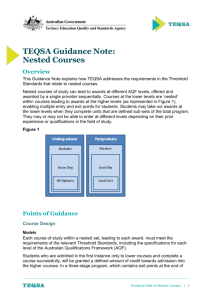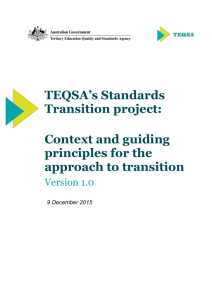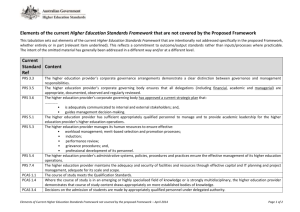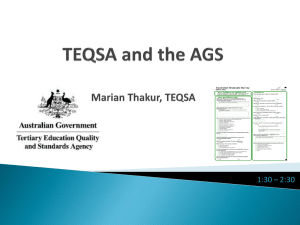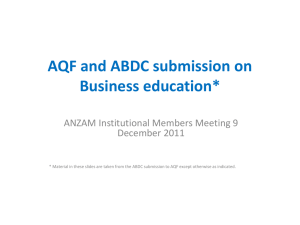DOCX 144KB, 9 pages - Tertiary Education Quality Standards Agency
advertisement
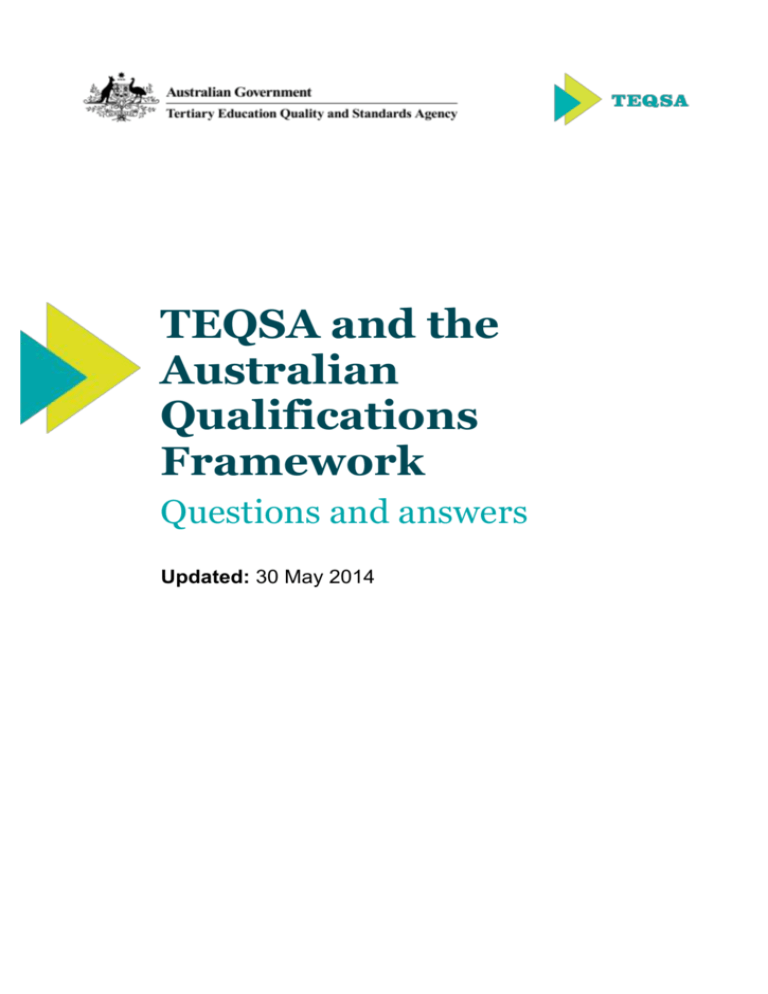
TEQSA and the Australian Qualifications Framework Questions and answers Updated: 30 May 2014 Tuesday 11th June 2013 TEQSA and the AQF What is TEQSA’s role in relation to the AQF? The AQF is the national policy that sets the specifications for regulated qualifications in Australia. TEQSA’s role is to regulate all higher education providers and ensure that providers and their courses meet the Threshold Standards. TEQSA applies the Threshold Standards in the context of three regulatory principles: reflecting risk, regulatory necessity and proportionate regulation (section 13, TEQSA Act, 2011). All regulatory activities must comply with these three principles. The Qualification Standards, which are part of the Threshold Standards, include a requirement that all higher education awards at Levels 5 -10 of the Australian Qualifications Framework (AQF) must meet the corresponding specifications in the AQF. There is some flexibility in the formulations used in parts of the AQF and TEQSA will apply this flexibility on a case-by-case basis in line with the overall principles of the AQF. For example the volume of learning is given as ‘typically’ a certain duration and usually as a range. In assessing whether courses meet the volume of learning requirements, TEQSA will be most concerned as to whether students are able to achieve the learning outcomes in the specified course duration. The AQF is developed and maintained by the Australian Qualifications Framework Council, not by TEQSA. The establishment of specifications for qualifications by the AQF Council is separate from the monitoring and enforcement functions carried out by TEQSA in the legislation. Stakeholders who wish to suggest alterations to the AQF should direct their suggestions to the AQF Council. Stakeholders who wish to suggest alterations to the Higher Education Standards should direct these to the Higher Education Standards Panel. What is the relationship between the AQF and the Qualification Standards? The AQF is a national policy (approved by the relevant Council of Commonwealth, State and Territory Ministers). The AQF comprises specifications for qualifications within a coherent framework, and policies for issuing qualifications, student pathways, and for registers of qualifications and organisations authorised to issue qualifications. The Qualification Standards are a set of requirements, in the form of a legislative instrument, which need to be met by Higher Education providers. TEQSA applies the Threshold Standards, including the Qualification Standards, when accrediting courses, registering providers or renewing registration. The Qualification Standards, in turn, require providers to ensure that all their higher education awards that lead to AQF qualifications meet the corresponding specifications in the AQF. Providers are also required to issue testamurs and records of results to graduates (and may also issue an Australian Higher Education Graduation Statement) that meet a number of specifications. The Qualification Standards also include requirements for providers to recognise prior learning and offer credit transfer and articulation. TEQSA and the Australian Qualifications Framework - Questions and answers | 1 How does TEQSA assess if higher education courses meet the Qualification Standards? In assessing whether higher education courses meet the Qualification Standards, TEQSA will observe the three regulatory principles: reflecting risk, regulatory necessity and proportionate regulation. TEQSA will assess courses against the Qualification Standards at the point of: provider re-registration course accreditation/re-accreditation (in the case of providers who do not have selfaccrediting authority) as required if an issue arises. At the point of re-registration of a provider with self-accrediting authority, TEQSA will not assess each and every course offered against the Qualification Standards. As part of the core scope of assessment, self-accrediting providers will need to submit evidence demonstrating implementation and effectiveness of self-accrediting processes including course development, course approval, course monitoring and course review. Processes should also ensure that courses comply with the AQF and professional accreditation requirements and more generally the Provider Course Accreditation Standards and the Qualification Standards (for more information refer to the process guide for renewal of registration). Providers with self-accrediting authority should have a plan that establishes AQF compliance by 1 January 2015. Newly accredited courses should be AQF compliant. How does TEQSA assess if the learning outcomes of a course are at the appropriate AQF level? To assess if the learning outcomes for a course meet the AQF level, TEQSA: compares the learning outcomes with the specified learning outcomes for the relevant AQF level and qualification type descriptor assesses whether the design of all components of the course support achieving the learning outcomes. TEQSA will call on external experts to assist in reviewing courses if required. How will TEQSA assess whether dual and joint awards meet the Qualification Standards? In the case of dual and joint awards submitted for accreditation TEQSA assesses if the design of all components will: support coherent learning outcomes for the level and qualification type and enable graduates to demonstrate them. More information is available on TEQSA’s approach at http://teqsa.gov.au/for-providers/provider-resources TEQSA and the Australian Qualifications Framework - Questions and answers | 2 How will TEQSA interact with professional bodies and registration boards when assessing the same course? In cases where both TEQSA and professional bodies are assessing the same course, there are benefits for all parties in collaborating. TEQSA is currently working with a number of professional bodies and its approach is under development. For more information refer to the TEQSA website at http://teqsa.gov.au/regulatory-approach/engagement-with-professional-bodies TEQSA welcomes providers submitting professional accreditation and other external review reports of its courses as part of applications for renewal of course accreditation and registration as evidence of effective self-regulation. How much flexibility do providers have in assigning titles to AQF awards? Section 1.1.2 of the Qualification Standards requires providers to use titles consistent with the AQF Qualifications Issuance Policy. This policy provides a table with examples of qualification titles for each level (see section 2.3). The AQF approach to assigning titles to awards is principle-based. The key formulation is: “AQF qualifications will have titles that unambiguously identify each qualification type, level and field of study/discipline”. The policy also states: “While it is common to list the qualification title before the field of study/discipline, the reverse order may be used. The field of study may be expressed broadly or explicitly and may also include sub-categories.” TEQSA will assess proposed course titles against the principles of the AQF Qualifications Issuance Policy. TEQSA will also observe the three regulatory principles in this assessment. How much flexibility do providers have in granting credit? Providers must be able to demonstrate that all courses meet the requirements of Provider Course Accreditation Standard 3.3: “Credit for previous studies or skills (including articulation, recognition of prior learning and credit arrangements) is consistent with the Qualification Standards and preserves the integrity of the higher education award to which it applies.” The Qualification Standards (Section 3) set the key principle that credit for previous studies or learning should be maximised, subject to preserving the integrity of learning outcomes and/or discipline requirements of the award. Negotiations with another provider for a formal credit agreement should set the level of credit granted according to the comparability of the individual course of study, with respect to the: learning outcomes volume of learning program of study, including content, and learning and assessment approaches. TEQSA and the Australian Qualifications Framework - Questions and answers | 3 The AQF Qualifications Pathways Policy gives indicative benchmarks for the minimum amount of credit that can be granted, describing these as ‘the basis of negotiations’ when reaching agreements with another provider. These benchmarks, however, are not incorporated within the Qualification Standards and are a point of reference only. Ultimately, TEQSA assesses whether the principles of the Qualification Standards have been met. The AQF benchmarks also refer to ‘linked’ courses, which are either courses within a nested set offered by the same provider, or comparable courses linked through a formal agreement with another provider. TEQSA may require evidence that allocations of credit are pedagogically defensible and that they preserve the integrity of qualification outcomes and discipline requirements. In deciding whether to ask for this evidence TEQSA will observe the three regulatory principles. Can Bachelor Honours degrees be awarded solely on the basis of merit? Merit (e.g. as a specified grade point average) is not listed as a criterion in the AQF level 8 Bachelor Degree specifications. TEQSA assesses courses designated as honours courses against the AQF requirements, including the research and volume of learning requirements. The Australian Council of Engineering Deans put a case to the AQF Council that integrated four-year engineering Bachelor Degrees aimed at entry to the engineering professions fully meet the criteria for Level 8 in the AQF, on the grounds that the advanced cognitive, technical and communication skills and skills to critically evaluate and transform information required in Level 8 are built into the accreditation standards of Engineers Australia, as well as the ability to conduct ‘investigations of complex problems using research-based knowledge and research methods’. It is not TEQSA’s role to revisit the consultations that took place in the period when the current AQF was being formed, or to take a position about engineering Bachelor Degrees in general. TEQSA will assess honours courses on a case-by-case basis and in considering whether to take any action, will have regard to the three regulatory principles. Can undergraduate units be included within a Graduate Diploma? The Bachelor Degree has been set at level 7, whereas the Graduate Diploma is at Level 8, the same level as the Bachelor Honours Degree. Both the Bachelor Honours Degree and the Graduate Diploma criteria include the requirement for developing ‘advanced’ knowledge, whereas this is not required for a Bachelor Degree. It is doubtful if advanced knowledge at Level 8 could be developed within a one-year Graduate Diploma if it made significant use of units from a Level 7 Bachelor Degree without adaptation. It is more likely that units from Bachelor Honours Degrees could be suitable for use within a Graduate Diploma, but this would be assessed on a case-by-case basis. For any given Graduate Diploma, TEQSA will assess whether the course as a whole meets the criteria for Graduate Diploma and if the course enables students to achieve the learning outcomes. TEQSA and the Australian Qualifications Framework - Questions and answers | 4 How much research should there be in Masters Degree (Coursework) courses? While the formulations in the AQF 2013 differ somewhat from the previous edition of the AQF, there is also continuity in the expectation that Masters Degree (Coursework) courses will contain a research dimension. The current specifications for the knowledge component of the Masters Degree (Coursework) include that all graduates must attain ‘knowledge of research principles and methods applicable to a field of work or learning’ (refer table of descriptors). In the ‘Application of knowledge and skills’ section, graduates are required to be able ‘to plan and execute a substantial researchbased project, capstone experience and/or piece of scholarship’. The AQF requires accrediting authorities (such as TEQSA) to ensure that ‘The Masters Degree (Coursework) is designed so that graduates will have undertaken a program of structured learning with some independent research and project work or practice-related learning.’ TEQSA concludes that all Masters Degree (Coursework) graduates are required to have knowledge of research principles and methods, and to undertake some independent research. Furthermore, project work or practice-related learning are alternatives to each other, not alternatives to research. How much flexibility is there in the volume of learning requirements for various types of Master Degrees? TEQSA takes account of developments in course delivery modes when assessing if a course meets the volume of learning requirements. As online and blended delivery becomes more common, including asynchronous components, expressing volume of learning as ‘time’ becomes more reliant on equivalence. In assessing courses against the volume of learning requirements, TEQSA is guided by the three regulatory principles in its assessment. Providers can demonstrate that the volume of learning of a course is equivalent to the requirements in different forms. Providers will need to present a pedagogically defensible argument that the specified learning outcomes can be achieved in a shorter timeframe. This is particularly required for Masters Degrees (Coursework) because the specifications require mastery of an advanced body of knowledge and research components. The volume of learning requirement is expressed in the AQF as being ‘the notional duration of all activities required for the achievement of the learning outcomes specified for a particular AQF qualification type’. The AQF volume of learning requirements for Masters degrees have recently been simplified and are now typically 1-2 years for Masters Degree (Research) and Masters Degree (Coursework). The volume of learning requirements for Masters Degrees are now expressed in a consistent way to other AQF qualifications. The underlying principle that must be observed is that all students should have a sufficient basis of prior knowledge and skills to achieve the learning outcomes and the learning outcomes for the AQF level in the time specified. Questions arise in relation to Masters Degrees (Coursework) in business fields, including the MBA. It is common for substantial business experience to be one of the entry requirements into the MBA, substituting to some extent for formal qualifications. Providers need to consider if substantial business experience can also be regarded as equivalent to experience in the discipline to justify a shorter volume of learning (for example one year instead of two years). TEQSA and the Australian Qualifications Framework - Questions and answers | 5 In general TEQSA does not expect that the same recognition of prior learning (RPL) would be used both for entry and for credit exemptions. Providers will need to ensure that where RPL is used as a pathway to an MBA (or any other course of study), the extent of previous experience is appropriately defined as both an admission criteria as well as contributing to credit (and therefore a shorter volume of learning) within the course of study. The underlying principle, however, must still be observed; all students should have a sufficient basis of prior knowledge and skills to achieve the course learning outcomes and the learning outcomes for the AQF level in the time specified. Masters Degrees (Coursework) at Level 9 requires acquisition of ‘an advanced body of knowledge’ and ‘extended understanding of recent developments in a discipline and its professional practice’. A provider would need to be able to demonstrate that applicants with no academic background in a discipline would be able to achieve these AQF outcomes in 1 - 2 years. The same considerations would apply in the case of Masters Degrees (Coursework) principally designed for professional conversion. It may be academically defensible to enrol students without prior experience in the academic discipline in a Level 8 qualification first, and allow them to articulate into the Masters Degree (Coursework) after demonstrating their ability to achieve academic learning outcomes. When will changes to meet AQF specifications have consequences for CRICOS? Part C, Section 7 of the National Code states that registering a course on CRICOS must include the expected duration of the course and ‘the designated authority must take into account the proposed course structure when determining the appropriate duration for registration on CRICOS’. In accordance with the National Code, any changes to the registered duration of a course must be approved by TEQSA prior to the changes being made. Whilst ELICOS and Foundation Programs are non-AQF courses, TEQSA also has regulatory responsibility for CRICOS registration of Foundation Programs and ELICOS courses linked to higher education programs. TEQSA will assess these courses against the relevant standards under the ESOS Act: ELICOS Standards Foundation Standards What is TEQSA’s role in assessing courses for non-AQF qualifications and awards? Registered higher education providers may apply to TEQSA for accreditation of a non-AQF course where the award or qualification is similar to a qualification covered by level 5, 6, 7, 8, 9 or 10 of the AQF, other than an award offered or conferred for the completion of a vocational education and training course. Non-award short courses, for example, do not fall within TEQSA’s regulatory functions under the TEQSA Act as they would not be regarded as similar. TEQSA regulates relevant non-AQF qualifications or awards against the Higher Education Standards Framework. TEQSA and the Australian Qualifications Framework - Questions and answers | 6 Providers should observe sections 1.2 and 2.1.2 of the Qualification Standards when issuing non-AQF qualifications and awards and in particular note that the certification and documentation relating to these awards: must not use AQF nomenclature must be clearly distinguished from AQF awards. There is an inconsistency between the requirements of the AQF and the Qualification Standards, what are TEQSA’s requirements for testamurs and graduation statements? There is an inconsistency between Qualification Standard 2.1.1 within the Higher Education Standards Framework (Threshold Standards) 2011 and the AQF Qualifications Issuance Policy within the second edition of the Australian Qualifications Framework. Qualification Standard 2.1.1 states that where an award leads to an AQF qualification: ‘the higher education provider ensures that it identifies the award as an award recognised by the AQF on the testamur or the Graduation Statement by either: the words, ‘The award is recognised within the Australian Qualifications Framework’, or the AQF logo, as authorised by the AQF Council.’ [emphasis added] The AQF Qualifications Issuance Policy states at 2.1.5: ‘The testamur or graduation statement for all AQF qualifications issued will identify the qualification as an AQF qualification either by the words ‘The qualification is recognised within the Australian Qualifications Framework’ or the use of any AQF logo authorised by the AQF Council.’ [emphasis added] Given the inconsistency between these two requirements TEQSA will be satisfied with compliance of the Qualification Standard 2.1.1 if testamurs and graduation statements include either: the words, ‘The award is recognised within the Australian Qualifications Framework’, or the words, ‘The qualification is recognised within the Australian Qualifications Framework’, or the AQF logo, as authorised by the AQF Council. Can providers include company logos on testamurs? The AQF Qualifications Issuance Policy clause 2.1.6 lists ‘minimum’ requirements for testamurs; a company logo on the testamur is not specifically disallowed. However, it is important that the logo cannot be misinterpreted. Providers need to be very careful about the representation and use of a commercial company’s logo (as would the company itself). Providers may also include more information in the associated Australian Higher Education Graduation Statement (AHEGS) to explain the award and course arrangements. Testamurs: should clearly state the awarding institution TEQSA and the Australian Qualifications Framework - Questions and answers | 7 be approved or authorised by the governing body (Council) of the awarding institution and any partners as appropriate may include reference to partnerships or other arrangements such as “in association with…” based on a formal agreement between the two organisations The underlying principle in providing testamurs is transparency, including for the international context, particularly about the awarding institution. Comprehensive details about the requirements for testamurs can be found in Qualification Standard 2.3.1. PCAS 4.2 states ‘the higher education provider ensures that staff . . .(are) qualified in the relevant discipline to at least one AQF qualification higher than the course of study being taught’. Is this a strict rule? TEQSA looks for staff to be appropriately qualified in the relevant discipline to at least one level higher than the AQF qualification level being taught, or to have equivalent professional experience. This requirement is to ensure that the provider has the appropriate academic staff profile to ensure students receive a quality learning experience. Consideration of the teaching staff will be done on a case by case basis as it is recognised that there are various combinations of qualifications and experience which would meet the requirements of the standards. There are three elements considered by TEQSA in assessing the suitability of the teaching staff for a particular course of study: Qualifications Professional Experience Relevance of the discipline If providers are relying to some extent on equivalent professional experience, this must be relevant to the course of study being taught and be equivalent to the required qualification level and specifications in the AQF. The provider should have a policy or framework underpinning its approach to assessing equivalence. In determining the relevance of the discipline TEQSA will also have regard to the units of study being taught by staff. These requirements also need to be read in the context of other requirements in section 4 of the Provider Course Accreditation Standards which add to the expectations in relation to the staff profile; including the need for staff to have a sound understanding of current scholarship and/ or professional practice in the discipline that they teach, have an understanding of pedagogical and/ or adult learning principles relevant to the student cohort being taught, and staff are advised of student and other feedback on the quality of their teaching and have opportunities to improve their teaching. Section 5 of the Provider Registration Standards also requires that a provider has appropriately qualified staff and academic leadership for its higher education operations and that there are human resource management processes in place including effective performance review, workload management and professional development. TEQSA and the Australian Qualifications Framework - Questions and answers | 8
